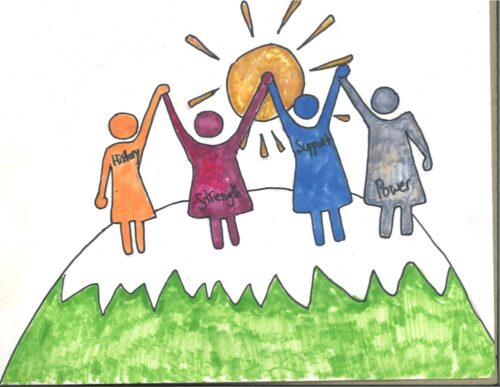Survival Beyond The Pandemic: Women’s History Month
By Shayna Gee
This year’s Women’s History Month theme is “We Keep Each Other Safe.” The programming offers a series of 13 free remote events including multiple healthy relationship workshops with Project SURVIVE. The Women’s and Gender Studies department, Women’s Resource Center, Queer Resource Center, and Associated Students have also organized events.
Beginning February through April, the events embody what it means to keep each other safe. The series included a book event with author and artist Chanel Miller, an Anti-Imperialist Feminist Leadership event with combat veteran and activist Brittany DeBarros, a Workplace Rights Workshop with Trabajadores Unidos Workers United, and many more.

Project SURVIVE is City College’s sexual violence prevention and healthy relationship promotion program that has been operating for more than 25 years. They train and pay peer educators on multi-layered topics.
In a recent event on healthy relationships, peer educators Hold, Diamund White, and Michael Rosenthal facilitated a Zoom workshop. The presenters jotted down community answers describing what healthy relationships look like surrounding a graphic of a heart with the text “Healthy Relationships” in the center.
The presenters also role-played a date scenario between two people who had differing power dynamics. The moderator took time to debrief the role-play, asking the presenters how they felt playing their character roles and addressing autonomy and accountability. Overall, the scenario taught what a healthy interaction includes.
Part of Project SURVIVE’s philosophy states that, “We can learn and share strategies to keep ourselves and each other safer, but rape is never a victim’s fault.”
After the roleplay scenario, presenters and the audience brainstormed risk reduction strategies that can be used before and during a date. Project SURVIVE provided many resources for the audience including a healthy relationship handbook and a handout titled “Protect Yourself and Your Friends.” In addition, they have a club that meets every Monday where students can drop in, build community, and share space.
In a White House brief on March 17, the House of Representatives passed the expired reauthorization of the Violence Against Women Act (VAWA), a law that protects domestic abuse and sexual violence victims, with a bipartisan vote of 244-172. The reauthorization of VAWA can aid funding for campus programs such as Project SURVIVE.
Project SURVIVE’s commitment to social justice is united to Women’s History Month, which celebrates all women, in which many historical as well as current movements have been led by women of color.
Women’s History Month programming kicked off with an event honoring Marsha P. Johnson. Johnson was a prominent figure of the 1969 Stonewall riot which birthed the Gay Liberation Front against police and state repression. Johnson’s activism and radical love for trans liberation and justice for people of color revolutionized the movement for the LGBTQ+ community.
The #MeToo movement was created by Tarana Burke, a Black woman in 2006 who wanted to empower marginalized women to reveal the magnitude of sexual harassment and assult. Although the movement has been popularized by white women and has since changed meanings, Burke’s Myspace post opened dialogue for sexual assault survivors around the world.
Labor leader, civil rights activists, and co-founder of the United Farm Workers of America (UFW) union, Dolores Huerta, organized for workers’ contracts while directing the first national boycott, the 1965 Delano grape strike.
Huerta attended the University of Pacific’s San Joaquin Delta College, where she received an associate degree. Through the Dolores Huerta Foundation, Huerta continues to be a defining leader for immigrants, workers, and the womens’ rights movement.
Patrisse Cullors, Alicia Garza, and Opal Tometi are radical Black organizers who created #BlackLivesMatter. The project started in 2013 after Trayvon Martin’s killer, George Zimmerman was set free. Their project now has a global network that centers women, queer and trans people in leadership.
These women and their contributions have laid forth the continual strategic organizing we see today. Importantly, women around the world are leading the workforce as frontline workers during the pandemic. This March 2021 marks one year since San Francisco and the nation went into shelter-in-place.
The once invisible narrative of ‘essential workers’ has brought to light how important food, agriculture, health care, janitorial, and many more essential service workers are to maintaining our everyday operations and care.
According to the national report from the Center of Economic and Policy Research, from 2014 to 2018, Women make up approximately 64% of frontline workers, despite making up half of all workers. In other reports including the Economic Policy Institute, this percent increased after 2018.
According to the Economic Policy Institute, women make up approxiately 76% of essential healthcare workers. The Mercury News reported a key finding from the National Nurses United, “A third of registered nurses who have died of COVID-19 in the US are Filipino, despite Filipino nurses only making up 4% of the nursing population nationwide.”
In addition, when examining intersecting identities, “Immigrants are overrepresented in Building Cleaning Services and in many frontline occupations…about one-in-six frontline workers, 17.3% are immigrants,” the report said.
Many people are still home, enduring new challenges with heightened social and political uprisings, mostly through digital screens. Women, particularly immigrant women of color have always been and continue working on the frontlines of this pandemic. From cashiers to health care to social service workers, what does protection look like for women and marginalized communities and how can we keep each other safe?
For more information and the list of full events on Women’s History Month, visit tinyurl.com/WHMccsf.
